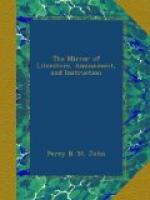* * * * *
SPIRIT OF THE PUBLIC JOURNALS
THE FOREIGN REVIEW, NO. IX.
More than one acknowledgment is due from us to this excellent work, although the publishers may doubt our sincerity by our selecting the following interesting Ballad, from the German of Christian Count Stolberg; which, observes the reviewer, “is by some considered the poet’s best effort, and a translation is therefore here attempted:”—
ELIZA VON MANSFIELD.
A BALLAD OF THE TENTH CENTURY.
“Still night! how many long for
thee!
Now while I wake to weep,
O thou to them hast comfort brought,
Repose and gentle sleep.
Wished too, thou comest to me; now I
Am lonely, and am free,
And with my many sighs profound
May ease my misery.
Alas! what evil have I done
They treat me so severely?
My father always called me his
Good child whom he
loved dearly.
My dying mother on my head
Poured her best blessings
forth:
It may in heaven be fulfill’d,
But surely not on earth!
Change not this blessing to a curse
For those who me offend.
O God! forgive them what they do,
And cause them to amend.
Ah, I with patience might bear all,
If, Love, thou wouldst not
be,
Thou who consumest my troubled heart
With hopeless agony!
If now, while one sweet hope remains,
I cannot this endure;
Thou breakest then, poor heart. So,
’till
Thou breakest, hold it sure.”




